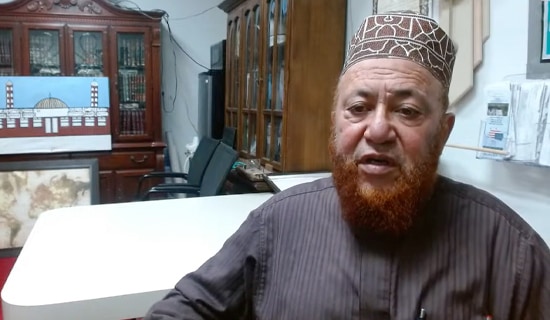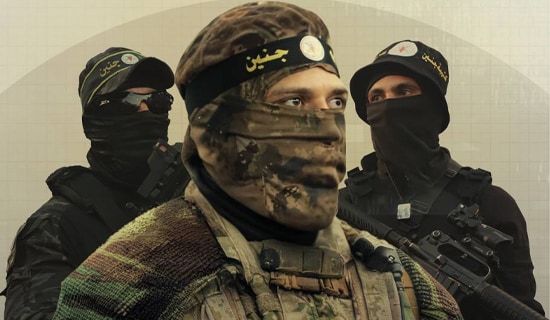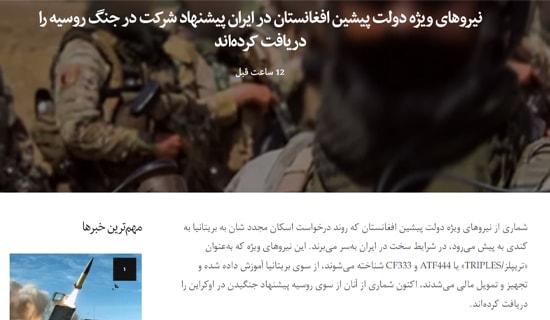Introduction
In a meeting on the evening of November 13, 2012, the Jordanian government approved a decision to cancel fuel subsidies; as a result, fuel prices in the country are expected to rise between 16%-32%. Following this decision, violent protests broke out in many cities and provinces across the country, including in the capital Amman. Thousands gathered in Amman's central Al-Dakhiliyya Square and announced a sit-down strike; in the various provinces and in other Jordanian cities, protestors shouted unprecedentedly harsh slogans against the regime and particularly against King 'Abdallah II.[1]
Jordanian Prime Minister: Decision Is Final, Should Have Been Made Two Years Ago
Further enraging the Jordanian opposition forces and citizens were statements by Jordanian Prime Minister 'Abdallah Ensour in an interview with Jordanian television that same evening. Ensour said that the decision to cut the subsidy was final and irrevocable, and explained that "if this move is postponed, we will face disaster and bankruptcy." Warning the Muslim Brotherhood (MB), which is the main opposition force in the kingdom, not to take advantage of the expected price increase to stir up the street, he added that the organization had been inciting against this move for weeks.
It should be mentioned that Jordan has been in severe economic crisis for some time, and that many international organizations, including the International Monetary Fund (IMF), are making their economic aid to the country conditional upon Jordan's cancellation of some product subsidies.
In the interview, Prime Minister Ensour explained that the government was forced to cut subsidies due to the kingdom's severe economic crisis. He added that Jordan's economy had been significantly impacted by the Arab Spring, and that since it began, Jordan had incurred losses of $4 billion-$5 billion, due mostly to the disruption of the supply of Egyptian oil to Jordan. He stressed that the Jordanian deficit was expected to reach 5 billion Jordanian dinars (over US$7 billion) by the end of 2012, and that since last year, Jordan's cash reserves had dwindled from 17 billion dinars to 7 billion. Ensour also said that subsidies for oil products should have been reexamined two years ago, but promised that within one week poor families in the kingdom would receive a cash payment to ease the blow, and that the government would transfer economic aid to each family, totaling 70 dinars per family member annually, up to six members; this, he claimed, would replace the fuel subsidy.[2]
At Amman's Al-Dakhiliyya Square: "The Revolution Of The Hungry Has Begun"
Immediately after the government approved the subsidy cut, thousands of protestors began arriving in Al-Dakhiliyya Square in Amman, calling to oust the Ensour government and to end corruption. Protestors announced a sit-down strike, carrying signs with slogans such as "The Revolution of the Hungry Has Begun" and "Beware My Hunger and My Rage." The protestors chanted "Oh, regime of the corrupt, oh regime of the oppressors..."
Also, there were extremely harsh calls against the king. Terming him "Ali Baba with the 40 Thieves," they shouted, "Oh 'Abdallah, oh son of Hussein, where did the people's money go?" and "we are free men, not your slaves" and "we worship Allah and are not your slaves." They also chanted, "The people want... reform – or else we will complete [the slogan]," that is, if the king enacts reform, the people will not topple the regime – "the people want to topple the regime" having been a standard slogan during Arab Spring protests.[3]
Both the website of the Jordanian daily Al-Sabeel, which is owned by the MB, and the student news website Talabanews.net reported that Jordanian security forces at Al-Dakhiliyya Square had blocked access roads to prevent additional protestors from arriving, and dispersed the crowd with batons and water cannons. According to the Al-Sabeel report, some protestors were wounded, and some were arrested by security forces. Al-Jazeera TV, which had covered the Arab Spring revolutions, broadcast live from the scene, including the dispersal of the protestors, but, also according to Al-Sabeel, security personnel forced it to stop filming.[4]

Protestors in Al-Dakhiliyya Square in Amman, November 13, 2012.[5]
Protests Spread Throughout Jordan
The protests and demonstrations spread throughout Jordan, from Al-Ramtha and Irbid in the north to Al-Karak, Ma'an, and Al-Aqaba in the south. Protestors blocked main roads and intersections and burned tires; some launched a sit-down strike in central squares in various cities and announced that they would remain there until the government reversed the decision to cut the subsidy. In Irbid, hundreds of citizens protested at the central Wasfi Al-Tal Square.[6] Rioting broke out in the town of Al-Salt in Al-Balqa' province, where protestors blocked roads and burned tires. In addition, protestors attempted to start a sit-down strike outside the prime minister's residence, but were stopped by security forces.[7]
In Ma'an, protests escalated into clashes with security forces, which resulted in several injuries. Some protestors burned their voter registration cards, issued for the parliamentary elections set to take place in a few months.[8]
Protests and demonstrations continued countrywide throughout the following day, November 14. Main roads in all provinces were blocked and tires were burned, and in some locations, such as the town of Al-Tafilah, there were violent clashes between protestors and security forces.[9]

Rioting across Jordan.[10]
Protestors throughout the country also attacked government and security installations. In Dhiban, a group torched the provincial government building and drove the governor from his office,[11] while dozens of angry protestors threw rocks at a security forces center and set security vehicles on fire.[12]

Reinforcements for security forces in Dhiban following attack on security forces center.[13]
In Al-Ramtha, armed men took over and robbed a gas station;[14] it was reported that in Irbid youths set a gas station on fire,[15] and that in Al-Karak protestors set the courthouse on fire and attempted to storm an electric company building.[16]
In Parts Of Jordan, Calls To Topple Regime
During the night of November 13-14, protestors in some provinces called to topple the regime; such calls are all but unprecedented in the kingdom. For example, the Jordanian website Khabarjo.net reported that at a protest march in Ma'an province, thousands chanted, "The people want to topple the regime."[17]According to another report, similar calls to topple the regime were heard in protests in Irbid province.[18]
A video uploaded to the Facebook page "The Jordanian Islamist Youth" showed scenes of November 13 protests staged by the Madaba popular movement in Dhiban, in which protestors can be heard calling, "Topple, topple the regime." They also called, "From proud Dhiban, we will declare a republic [i.e. instead of a monarchy]."[19] Likewise, the protestors who set fire to the provincial government building in Dhiban chanted, "The people want to topple the regime" (to view the YouTube video, click here).
Calls For General Strike, Civil Disobedience, Popular Intifada
Various organizations and forces throughout the kingdom called for a general strike among all sectors. The teachers' union declared a general strike, to commence November 14 in all schools, and called on citizens not to send their children to school. It also called on all teachers to participate in protests. Many universities and colleges also joined in the strike.[20] The rest of the unions also joined the strike, including the lawyers' and engineers' unions.[21]
Customs officials at Al-'Aqaba port announced that they would join in the strike, effectively crippling port operations.[22]
Hundreds of citizens in the city of Al-Tafilah announced that they would launch a civil disobedience campaign.[23] Some websites reported that on November 13, 70 youth and reform movements had also declared that they would begin a civil disobedience campaign throughout the kingdom.[24]

Calls on Facebook for general strike in all sectors[25]
Nationalist, leftist, and youth organizations issued a joint communiqué calling for a popular intifada under which all protest movements from north to south would unite. It read: "Behold! The regime continues in the path of increasing prices and [further] impoverishing the poor, with total contempt for our interests and our consciousness. It repeats the same script... that it used [in 1989], during the blessed April Uprising[26]... Everyone today understands the details of the organized looting committed by this regime, as it conspires with the global capital, led by the U.S. They [the regime] must know that this organized looting has become impossible and unacceptable, and that the response to it has already begun and will continue without ceasing until [the government] is forced to rescind its decision.
"All praise to the residents of the south, from Al-Karak to Ma'an to Al-Tafilah, who today wage a new and successful April Uprising; all praise to the residents of the north... All praise to the residents of 'Amman, Al-Zarqa, and Madaba, who went out [to the streets and] united the intifada of the homeland...
"Our demands are clear: Immediately rescind the decision to cancel the fuel subsidy, and rescind all agreements with the IMF and the World Bank..."[27]
MB Warns Of Escalation, Calls For Sit-Down Strike In Al-Dakhiliyya Square
Following the spread of protests on the night of November 13-14, Jordanian MB Supreme Guide Hamam Sa'id called on King 'Abdallah to alleviate the situation by rescinding the decision to cut the fuel subsidy. Sa'id claimed that the decision impacted all members of society and kept them from attaining even a minimally dignified standard of living; he stressed that the people could not bear any additional burden. He also demanded "immediate constitutional reforms to restore the rule to the people, so that it can settle accounts with corrupt officials and reclaim the funds, companies, and land that have been stolen from them." He also called on the king to postpone the parliamentary elections, "as the present atmosphere would not [permit] elections that will be acceptable to the people."[28]
During the night, Sa'id's deputy Zaki Bani Arshid told the Turkish news agency Al-Anadolu that the bold protests that had followed the government decision were only "a rehearsal in anticipation of the escalation expected tomorrow, Wednesday [November 14]." He called on the Jordanian government to immediately rescind its decision, warning that if it did not, "the situation will get out of control."[29]
On November 14, the Jordanian daily Al-Sabeel reported that the MB was planning to stage a sit-down strike in 'Amman's Al-Dakhiliyya Square, from 4:00 PM to the following morning;[30] the strike was forcibly dispersed.[31]
Salafiyya-Jihadiyya In Jordan: We Support The People's Demands; The Oppressors Must Be Deterred
The Salafiyya-Jihadiyya in Jordan also expressed support for the anti-government protests. Senior official Abu Muhammad Al-Tahawi condemned the subsidy cut, and voiced concern that the country was headed towards an abyss. He stressed that his movement supported the people and its just demands, and that the government decision was tantamount to "terrorizing and starving the people, and stealing its daily bread." He added that the government decision was made "to please the corrupt and further line their pockets," explaining that there was no choice but "to deter and confront the oppressors."[32]
*H. Varulkar is Director of Research at MEMRI.
[1] Assabeel.net, November 13, 2012; Alarabiya.net, November 14, 2012.
[2] Al-Dustour (Jordan), Al-Sharq Al-Awsat (London), Alarabiya.net, November 14, 2012.
[4] Assabeel.net, Talabanews.net, November 13, 2012.
[5] Photo on left: Al-Ghad (Jordan); Photo on right, Assabeel.net, November 14, 2012.
[6] Al-Ghad (Jordan), Assabeel.net, November 14, 2012.
[7] Assabeel.net, November 14, 2012.
[8] Assabeel.net, November 13, 2012. http://www.youtube.com/watch?v=Ol-5s9lRmHI.
[9] Assabeel.net, November 14, 2012.
[10] Assabeel.net, November 14, 2012.
[11] Assabeel.net, November 14, 2012. For a video of the provincial government building in Dhiban being set on fire, see http://www.youtube.com/watch?v=MgRWReN59uo.
[12] Al-Ghad (Jordan), November 14, 2012.
[13] Al-Ghad (Jordan), November 14, 2012.
[14] Assabeel.net, November 14, 2012.
[15] Alarabiya.net, November 14, 2012.
[16] Assabeel.net, November 13, 2012.
[17] Khabarjo.net, November 13, 2012.
[18] Alhadthnews.net, November 13, 2012.
[20] http://www.facebook.com/IslamicJY; Al-Ghad (Jordan), November 14, 2012.
[21] Assabeel.net, November 13, 2012.
[22] Al-Ghad (Jordan); Assabeel.net, November 14, 2012.
[23] Assabeel.net, November 13, 2012.
[24] Aa.com.tr; Watnnews.net, November 13, 2012.
[26] The "April Uprising" refers to countrywide protests in April 1989 after the Jordanian government raised prices following the sharp fall of the dinar due to the first Gulf War. The protestors went on to demand public freedoms and the toppling of the regime. The uprising resulted in parliamentary elections, a new government, the legalization of political party activity, and the revocation of the state of emergency which had been in force since 1967.
[27] Assabeel.net, November 14, 2012.
[28] Assabeel.net, November 14, 2012.
[29] Aa.com.tr, November 13, 2012.
[30] Assabeel.net, November 14, 2012.
[31] Assabeel.net, November 14, 2012.
[32] Assabeel.net, November 14, 2012.





